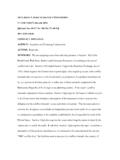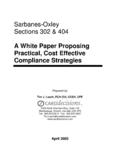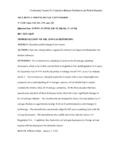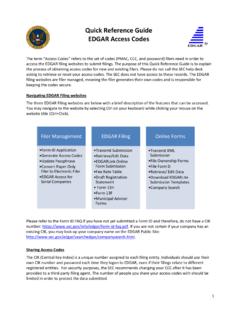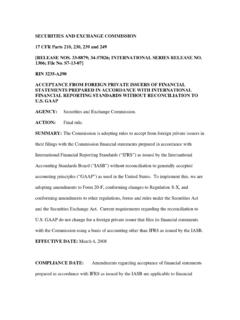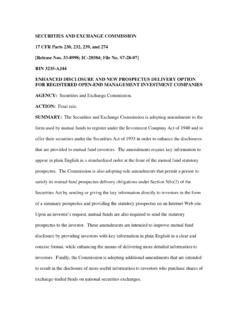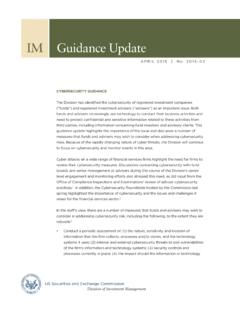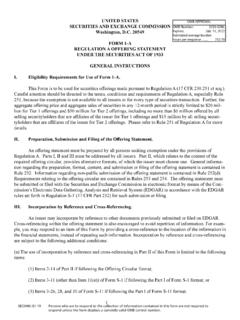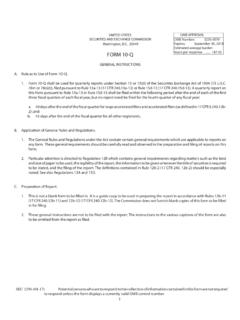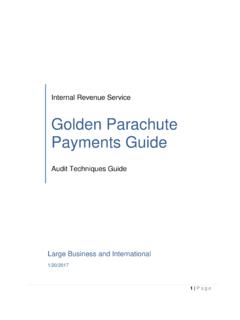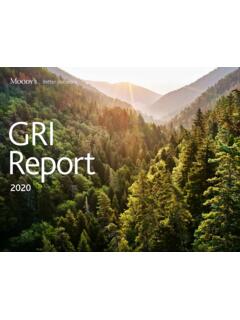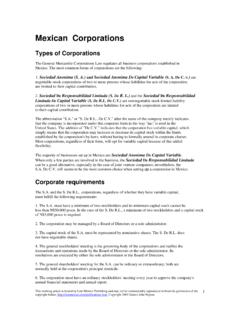Transcription of SECURITIES AND EXCHANGE COMMISSION 17 CFR Part 240 ...
1 Conformed to Federal Register Version SECURITIES AND EXCHANGE COMMISSION . 17 CFR Part 240. [Release No. 34-93596; IC-34419; File No. S7-24-16]. RIN 3235-AL84. Universal proxy AGENCY: SECURITIES and EXCHANGE COMMISSION . ACTION: Final rule. SUMMARY: The SECURITIES and EXCHANGE COMMISSION ( COMMISSION ) is amending the Federal proxy rules to enhance the ability of shareholders to elect directors though the proxy process in a manner consistent with their ability to vote in person at a shareholder meeting . Specifically, the COMMISSION is requiring the use of a universal proxy card in all non-exempt solicitations involving director election contests, except those involving registered investment companies and business development companies.
2 To facilitate the use of a universal proxy card, the COMMISSION is also amending the Federal proxy rules to establish certain notice, minimum solicitation, filing, formatting and presentation requirements, along with other related rule changes consistent with the adoption of a universal proxy requirement. In addition, the COMMISSION is adopting new disclosure requirements relating to voting standards and further requiring certain voting options for all director elections, whether or not contested. DATES: Effective date: The rules are effective January 31, 2022. Compliance dates: See Section FOR FURTHER INFORMATION CONTACT: Christina Chalk, Senior Special Counsel, or David M.
3 Plattner, Special Counsel, in the Office of Mergers and Acquisitions, at (202) 551-3440, Division of Corporation Finance, SECURITIES and EXCHANGE COMMISSION , 100 F Street, NE, Washington, DC 20549. SUPPLEMENTARY INFORMATION: We are adopting amendments to 17 CFR. ( Rule 14a-2 ), 17 CFR ( Rule 14a-3 ), 17 CFR ( Rule 14a-4 ), 17 CFR ( Rule 14a-5 ), 17 CFR ( Rule 14a-6 ), and 17. CFR ( Schedule 14A ), and new rule 17 CFR ( Rule 14a-19 ), each under the SECURITIES EXCHANGE Act of 1934 [15 78a et seq.] ( EXCHANGE Act ). 1. 1. Unless otherwise noted, when we refer to the EXCHANGE Act, or any paragraph of the EXCHANGE Act, we are referring to 15 78a of the United States Code, at which the EXCHANGE Act is codified, and when we refer to rules under the EXCHANGE Act, or any paragraph of these rules, we are referring to title 17, part 240 of the Code of Federal Regulations [17 CFR part 240], in which these rules are published.
4 2. TABLE OF CONTENTS. I. INTRODUCTION. A. Background B. Overview of Final Amendments II. DISCUSSION OF FINAL AMENDMENTS. A. Mandatory Use of Universal Proxies in Non-Exempt Solicitations in Contested Elections 1. Proposed Rules 2. Comments Received 3. Final Amendments B. Dissident's Notice of Intent to Solicit Proxies in Support of Nominees Other than the Registrant's Nominees 1. Proposed Rules 2. Comments Received 3. Final Amendments C. Registrant's Notice of Its Nominees 1. Proposed Rules 2. Comments Received 3. Final Amendments D. Minimum Solicitation Requirement for Dissidents 1. Proposed Rules 2. Comments Received 3. Final Amendments E. Dissident's Requirement to File Definitive proxy Statement 25 Calendar Days Prior to meeting 1.
5 Proposed Rules 2. Comments Received 3. Final Amendments F. Access to Information about All Nominees 1. Proposed Rules 2. Comments Received 3. Final Amendments G. Formatting and Presentation of the Universal proxy Card 1. Proposed Rules 2. Comments Received 3. Final Amendments 3. H. Director Election Voting Standards Disclosure and Voting Options 1. Proposed Rules 2. Comments Received 3. Final Amendments I. Bona Fide Nominee and Short Slate Rules 1. Elimination of the Short Slate Rule a. Proposed Rules b. Comments Received c. Final Amendments 2. Modification of the Bona Fide Nominee Rule a. Proposed Rules b. Comments Received c. Final Amendments J. Funds 1. Proposed Rules 2.
6 Comments Received 3. Final Amendments K. Compliance Dates III. OTHER MATTERS. IV. ECONOMIC ANALYSIS. A. Introduction B. Baseline 1. Affected Parties a. Shareholders b. Registrants c. Dissidents in Contested Elections d. Directors 2. Contested Director Elections a. proxy Contest Data b. Notice, Solicitation, and Costs of proxy Contests c. Results of proxy Contests d. Split-Ticket Voting 3. Other Methods to Seek Change in Board Representation C. Discussion of Economic Effects 1. Effects on Shareholder Voting 2. Potential Effects on Costs of Contested Elections a. Typical proxy Contests b. Nominal proxy Contests 3. Potential Effects on Outcomes of Contested Elections 4. 4. Potential Effects on Incidence and Perceived Threat of Contested Elections a.
7 Typical proxy Contests b. Nominal proxy Contests 5. Specific Implementation Choices a. The Short Slate and Bona Fide Nominee Rules b. Use of Universal Proxies c. Voting Standards Disclosure and Voting Options V. PAPERWORK REDUCTION ACT. A. Summary of the Collection of Information B. Effect of the Final Amendments on Existing Collections of Information C. Aggregate Burden and Cost Estimates for the Amendments VI. FINAL REGULATORY FLEXIBILITY ACT ANALYSIS. A. Need for, and Objectives of, the Final Amendments B. Significant Issues Raised by Public Comments C. Small Entities Subject to the Final Amendments D. Projected Reporting, Recordkeeping, and Other Compliance Requirements E.
8 Agency Action to Minimize Effect on Small Entities VII. STATUTORY AUTHORITY. 5. I. INTRODUCTION. A. Background State statutes require corporations to hold an annual meeting of shareholders for the purpose of electing directors. 2 A shareholder's ability to participate in the election of directors is a fundamental right under state corporate law, 3 and the process by which directors are elected is a fundamental aspect of corporate governance that is central to maintaining the accountability of directors to shareholders. Today, few shareholders of public companies with a class of SECURITIES registered under the EXCHANGE Act attend a registrant's meeting to vote in person. 4 Instead, the primary means for shareholders to become informed about matters to be decided on at a meeting and to vote on the election of directors and other matters is through the proxy process.
9 2. See, , Model Bus. Corp. Act section ( 2016 ); Cal. Corp. Code section 600(b); Del. Code. Ann. tit. 8, section 211(b); Bus. Corp. Law section 602. 3. See Preston v. Allison, 650 646, 649 (Del. 1994); see also Blasius Indus., Inc. v. Atlas Corp., 564 651, 659 (Del. Ch. 1988) ( The shareholder franchise is the ideological underpinning upon which the legitimacy of directorial power rests. ). 4. During the COVID-19 pandemic, many registrants have held virtual rather than in-person shareholder meetings. Because registrants holding virtual shareholder meetings conducted proxy solicitations in the same manner as they would for in-person meetings, for purposes of this release, our references to in-person meetings include virtual shareholder meetings unless otherwise indicated.
10 Although virtual shareholder meetings have become more prevalent, it remains unclear whether virtual shareholder meetings will be used as frequently in the future. Because voting at a virtual shareholder meeting still requires attendance by a shareholder, most shareholders are likely to continue to rely on the proxy voting system to exercise their vote. This is supported by the fact that, during 2020, the vast majority of shareholders who attended virtual shareholder meetings did not vote at the meetings. Instead, to the extent they voted, they did so in advance by proxy or via voting instruction forms submitted in advance of the meetings, rather than by attending the virtual shareholder meeting and casting their votes at the meeting .

